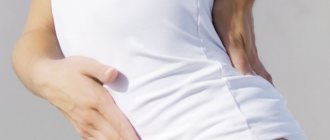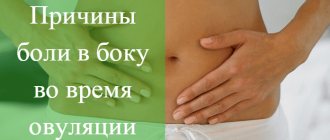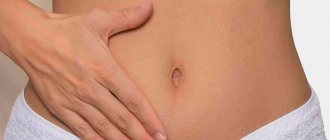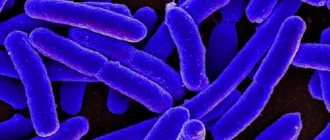Menstrual migraine is studied at the intersection of two specialties: neurology and gynecology. On the one hand, these are hemicranias associated with the menstrual cycle and days of menstruation in women, on the other, a variant of the cephalgic form of premenstrual syndrome. Therefore, this disease is even more common in gynecological practice than in neurology.
The International Headache Society has classified migraine during menstruation as a separate form. Catamenial migraine (menstrual) is a migraine without aura, when a migraine headache occurs a few days before menstruation and persists throughout the entire period of bleeding in the absence of similar attacks during the intermenstrual period.
A number of researchers distinguish two subgroups of migraine:
- True menstrual – exclusively associated with menstruation;
- Associated with menstruation - in most cases, cephalgia is observed during the perimenstrual period, but there may be manifestations on other days of the cycle.
Why do I have a headache during menstruation? Reasons
Most women suffer from headaches during menstruation. The reason for this is provoking factors of both pathological and natural origin.
Migraine susceptibility
In women susceptible to migraine attacks, headaches during menstruation become more intense, and the accompanying symptoms become more painful. Painful sensations most often develop a few days before the cycle, signaling the approach of menstruation, and in the first days of menstruation. At the end of the cycle and in the period between menstruation, the woman’s condition improves and she ceases to experience discomfort.
Vascular diseases
During menstruation, the load on the vessels increases due to the acceleration of blood flow through them. Vessels whose wall tone is reduced and their elasticity is impaired are unable to respond to these changes, as a result of which the woman begins to be bothered by pressing and spasmodic headaches.
Hormonal surges
During the period between menstruation, a woman’s body, for natural reasons, prepares for bearing a fetus. This process is accompanied by the production of large amounts of progesterone. In the absence of conception, a woman begins her period, and the level of the hormone decreases sharply, which provokes the occurrence of migraine headaches and other associated symptoms.
Anemia
The disease is characterized by a lack of red blood cells in the blood. During menstruation, headaches are provoked by loss of blood and an even greater decrease in red cells in its composition, as well as insufficient oxygen supply to the brain due to this.
Taking contraceptives
Poorly selected medications can trigger the development of headaches during menstruation. The reason for this is a hormonal change, which occurs due to an artificial increase in progesterone levels and its subsequent sharp decrease during menstruation.
Water-salt balance
Before menstruation, a woman’s body experiences a water imbalance caused by egg rejection. As a result, her limbs and face swell. If the swelling spreads to the brain tissue, then the woman begins to experience aching and pressing sensations localized in the back of the head and parietal part.
Intestinal problems
With weakened peristalsis, the intestines are not able to fully remove toxins. On critical days, the blood, due to accelerated flow, is cleansed and discharges an additional amount of harmful accumulations into the intestines. Untimely removal of toxins due to additional load on the intestines leads to their return to the blood and the appearance of intoxication. As a result, the woman experiences headaches, weakness and other symptoms indicating mild poisoning.
Symptoms of menstrual migraine
Migraine during menstruation can be true and associated. The true menstrual form of the disease begins from the day of the first bleeding and ends with its last day. The associated form is characterized by cephalgia both on perimenstrual and other days. In addition to headaches, menstruating women are concerned about symptoms that are not related to the disease with aura:
- Psycho-emotional disorder (irritability, tearfulness, anxiety, mood swings, absent-mindedness, insomnia);
- Decreased physical activity (weakness, fatigue, chronic fatigue);
- Changes in the sensory organs (decreased visual acuity, excessive response to intense sound, strong smell, bright light);
- Autonomic disorders (drops in blood pressure, tachycardia, increased sweating);
- Functional changes in the gastrointestinal tract (nausea developing into vomiting, loss of appetite).
Interesting: Acupressure of the head for migraines at home, acupuncture (acupuncture)
In addition to the usual headache during menstruation, a woman’s condition is aggravated by the following symptoms:
- Dull pain in the lower abdomen;
- engorgement and tenderness of the mammary glands, their increase in size;
- Aching pain in the lower back, sacrum;
- Bloating, flatulence.
How to relieve period pain
If a woman regularly experiences headaches and other painful symptoms during menstruation, she should consult a gynecologist. If during the examination and diagnosis no serious pathologies are identified, then the doctor can give the woman general recommendations for alleviating pain in the premenstrual period and directly during menstruation:
- Use medications to relieve menstrual pain.
- Change your daily schedule by increasing your rest hours on these days.
- Limit the consumption of alcoholic beverages and coffee, eliminate the effects of nicotine on the body.
- Take long walks in the fresh air, especially before bed.
- Replace unhealthy foods in your diet with healthy ones.
Foods that should be temporarily excluded from a woman’s diet if she is susceptible to menstrual pain include:
- sausages;
- meat products (beef, pork);
- chocolate;
- seasonings;
- fermented milk products (blue cheese, sour cream);
- coffee, strong tea.
During menstruation, the consumption of the following products should be limited to prevent painful attacks:
- potato;
- flour products (pasta, white bread);
- corn.
Instead of the listed products, you should include in your diet:
- vegetables (beets, all types of cabbage, lettuce, greens, pumpkin, turnips);
- porridge – buckwheat, oatmeal;
- dietary poultry meat – chicken breast, turkey breast;
- walnuts;
- bread of gray and black varieties.
Compliance with these simple rules will allow a woman to reduce the impact of painful symptoms, as well as to lead full activities and an active lifestyle during menstruation.
Prevention of menstrual migraine
Migraine during menstruation should be prevented; at the present stage of studying the problem, there is enough information to help patients with migraine; it is indicated for the development of more frequent paroxysms.
Recommendations for proper nutrition
- The diet should be enriched with magnesium (peanuts, buckwheat and oatmeal, wheat bran);
- Eating foods rich in riboflavin (vitamin B2) - pine nuts, beef liver, sunflower and sesame seeds;
- Low salt diet;
- Increase in omega-3 fatty acids (flaxseed and oil) in the diet;
- Drinking regime (1.5-2 liters of clean water).
Prevention is carried out in the following areas:
Folk remedies for menstrual migraine
- Aromatherapy (lavender oil, peppermint oil, which can be applied directly to the temple area);
- Herbal medicine (pyrethrum, ginger, coriander, decoctions and infusions are prepared);
- Fish oil (affects the activity of the nervous system, normalizes the psycho-emotional background).
Non-drug remedies
- Psychotherapy (relaxation techniques, meditation, yoga);
- Physiotherapy (acupuncture, massage, therapeutic exercises).
Tablets for headaches during menstruation
If, before menstruation or directly during the cycle, a woman is bothered by painful headaches and thereby reduces her vital functions, it is necessary to take one of the following painkillers:
- Nurofen - the active substance Ibuprofen in the composition helps to quickly relieve headaches during menstruation. For moderate to severe pain, the effect of taking the tablet is achieved after 30 minutes and lasts up to 8 hours.
- Imet - tablets with the same substance in the composition are indicated for mild to moderate headaches. For pain caused by the menstrual cycle, a woman needs to take an Imeta tablet once after a meal. If pain occurs regularly, it is recommended to take the drug for 2-3 days in three doses, leaving a gap of 4 hours between them.
- Citramon - acetylsalicylic acid in the composition of the product has an analgesic and anti-inflammatory effect. For headaches caused by menstruation, it is recommended to take Citramon tablet at the beginning of the attack. Under this condition, the drug will have a quick analgesic effect, the effect of which will last up to 6 hours.
- Ketanov is one of the most effective drugs that is used to relieve both headaches during menstruation and other menstrual pain.
The selection of a specific drug and dosage should be carried out together with the doctor, taking into account individual indications, prohibitions, as well as the risks of side effects.
Treatment of menstrual migraine
There are two golden rules in medicine: “Do no harm” and “From simple to complex.” You should also adhere to them in the treatment of migraine. The essence of the rules comes down to prescribing a minimum amount of drug therapy with the maximum use of all possible methods.
In this regard, the treatment algorithm for patients with migraine during menstruation is as follows:
- Proper nutrition. All foods that are potential migraine triggers are excluded from the diet.
- Mode. Organize your daily routine in such a way that it does not disturb a woman’s biological rhythms.
- Relaxation techniques, meditation, yoga.
- Sauna. During a migraine attack and during menstruation, it is contraindicated due to the risk of possible complications (infectious and hemorrhagic complications).
- Massage. Acupressure and general massage have a good distracting effect. During the massage, it is possible to influence acupressure points, which has an analgesic effect.
- Acupuncture. The method is widely used for pain relief and medicinal purposes.
- Phytotherapy. To combat migraines, use fresh potato juice, a decoction of meadow clover flowers, Siberian elderberry, and St. John's wort.
- Drug treatment. Treatment with medications should be resorted to when all other methods have proven ineffective, attacks are repeated, and the pain is not relieved.
Drug treatment of menstrually associated migraine is traditionally divided into symptomatic and hormonal. Symptomatic remedies are aimed at relieving manifestations characteristic of the disease (primarily relieving headaches). Hormone therapy is given to suppress ovulation and therefore stabilize sex steroid levels at steady-state levels.
How to treat and relieve migraine symptoms, first of all, to eliminate an attack of menstrual headaches, you can use the following medications:
- NSAIDs (diclofenac, xefocam, mefenamic acid);
- Vitamin therapy (vitamin E, B6);
- Homeopathic medicines (mastodinon, agnukaston, notta);
- B-blockers (propranolol);
Interesting: Cervical migraine: causes, diagnosis, symptoms and treatment
Antidepressants:
- Tricyclics (amitriptyline, tianeptine);
- Quadruple cyclic (lerivon);
- Selective serotonin reuptake inhibitors (SSRIs) (fluoxetine, sertraline);
- Vegetotropic drugs (Grandaxin).
During the reproductive period, hormonal levels often change; in order for hormones to be at a stable level, the process of ovulation must be eliminated. To suppress ovulation, the following medications can be taken:
- Combined oral contraceptives (Yarina, Dimia, Midiana, which have intimineralocorticoid activity, have proven themselves well);
- Antigonadotropins (danazol, block the synthesis of FSH and LH);
- GnRH agonists (buserelin, diferelin, realize their action at the level of the hypothalamus);
- Progestins (progesterone preparations: duphaston).
Therapy that suppresses ovulation is based on maintaining a stable level of sex steroids at a high level, then migraine during menstruation becomes manageable, and attacks can be prevented. These medications are not recommended for women planning reproductive function or for other reasons. If migraine after menstruation occurs against the background of low estradiol levels, such patients are also shown a replacement method of therapy.
Tablets for menstrual pain
During menstruation, a woman is bothered not only by headaches, but also by unpleasant, pulling sensations in the lower abdomen. Quite often, menstrual pain is so unbearable that folk remedies do not help and the woman has to take a painkiller. There are medications in the form of injections and tablets, in which the action of active substances is aimed at eliminating all pain that occurs during menstruation.
Ketanov during menstruation
The drug from the NSAID group is an effective remedy for relieving menstrual pain. When painful sensations appear that are caused by spasms of the blood vessels in the head and contraction of the uterus, Ketanov is taken once in the form of a tablet or intramuscular injection. In case of severe and prolonged pain attacks, it is allowed to take the drug according to the following regimen: no more than 5 days with a time interval of at least 6 hours between doses.
Spasmalgon during menstruation
The tableted product is prescribed for moderate and mild menstrual pain. Due to the active substances included in the composition, Spazmalgon has a relaxing effect on the walls of blood vessels and the muscles of the uterus, thereby eliminating attacks of headaches during menstruation and the lower abdomen. Spazmalgon tablet is drunk once when pain occurs or taken in a course according to the scheme: three times a day, 1 pc. within 2-3 days. Women who have diseases of the blood, gastrointestinal tract or renal system should take painkillers in consultation with their doctor.
Ketorol for menstruation
A drug with a pronounced analgesic effect is an analogue of Ketanov. It is also used in tablet or injection form for moderate to severe menstrual pain in the head and abdomen. If the dosage is observed, it does not depress the central nervous system and does not affect the heart or vascular system. For moderate menstrual pain, take a Ketorol tablet once. If a woman develops a severe pain attack, then it is necessary to give an injection.
https://youtu.be/oMwtEsxbvaA








